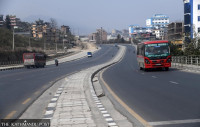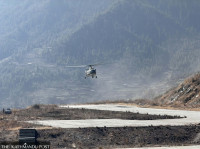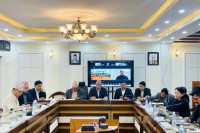National
Seven health facilities closed after Bajura local unit removed contract employees
Many rural health centres were staffed almost entirely by contract employees paid by local governments.
Arjun Shah
A sweeping decision by the Budhiganga Municipality in Bajura, a remote hill district of Sudurpaschim Province, to terminate all contract-based employees has crippled essential public services. The health sector is hit hardest by the decision.
Officials confirmed that the municipality relieved 120 staff members of their duties effective from mid-October, after deciding not to renew their contracts.
The move has forced the closure of seven health facilities—including a birthing centre—across the municipality’s remote wards, leaving thousands without access to even basic health care.
According to the municipality’s health division, 46 health workers were dismissed, including one medical officer, three fifth-level staff, 22 fourth-level staff, and 20 office assistants.
“The decision has left Amkot, Musi, Tapra, Delta, Bamka, Motabada, and Selapakha health centres completely shut,” said municipal spokesperson Hemraj Jaisi. “Each of these centres had at least an Auxiliary Health Worker (AHW), an Auxiliary Nurse Midwife (ANM), and a support staff.”
The Selapakha Community Health Centre, which also housed a birthing facility, is among the worst affected. Located in one of Budhiganga’s most remote areas, it served dozens of patients daily and handled around five childbirths every month.
“This centre [Selapakha Community Health Centre] was established in 2015 to serve women who had to walk hours to reach the nearest hospital,” said ANM Devika Singh. “Now that it’s shut, pregnant women will be forced to travel to Bayalpata Hospital in neighbouring Achham district for delivery. That’s a journey of several hours on foot and by bus.”
The municipality’s only medical doctor, Dr Kiran Thapa, who served at the Tante Health Post on a contract, was also among those dismissed. “We used to serve an average of 45 patients a day,” Thapa said.
“With this decision, only five permanent staff remain to handle all medical needs. Laboratory and X-ray services have stopped entirely. It feels like we’ve gone back to the pre-2015 state of health care.”
Bajura’s remote municipalities, including Budhiganga, have long struggled to retain health workers due to the lack of permanent positions and difficult living conditions. Many rural health centres were staffed almost entirely by contract employees paid by local governments, a system that had kept services running despite limited federal funding.
With this latest decision, Budhiganga has become completely doctorless, severely undermining primary care and emergency response capacity in the region.
The mass dismissal has also affected other municipal offices. Several ward offices are now without essential staff. In Ward 7, for instance, only the secretary remains; all other six employees, including agricultural and veterinary technicians, a psychosocial worker, and administrative assistants, have been let go.
Similarly, Ward 3 chair Khadak Bahadur Adhikari said that out of six employees, four were terminated. “With only a secretary and one office assistant left, it will be difficult to manage regular ward functions,” he said.
Ram Bahadur Baniya, mayor of Budhiganga Municipality, defended the decision, stating that it was compelled by new legal and financial restrictions. According to him, the move was prompted by four key reasons: a recent circular from the Ministry of Finance barring the employment of non-permanent staff, provisions for the Sudurpaschim Province Local Service Formation and Operation Act 2024, audit irregularities cited by the Office of the Auditor General, and pending inquiries at the Commission for Investigation of Abuse of Authority (CIAA).
“The law clearly bars municipalities from hiring anyone outside the approved staff quota,” Baniya explained. “While other sectors can still function with permanent employees, the health sector has been badly affected. We’re exploring legal ways to manage the crisis.”
Section 15 of the new provincial act prohibits local bodies from hiring staff on a contract or daily-wage basis. Violators, including officials who approve such hiring, can be held personally liable for recovering the funds. However, the act allows exceptions for certain technical positions—such as health workers, engineers, drivers, electricians, plumbers, and sanitation workers—if the provincial ministry grants approval.
Despite this provision, Budhiganga had not sought such approval before the contracts expired, leading to an abrupt termination.
Health experts warn that the blanket dismissal violates the spirit of the federal health policy, which emphasises uninterrupted access to basic care.




 25.42°C Kathmandu
25.42°C Kathmandu















